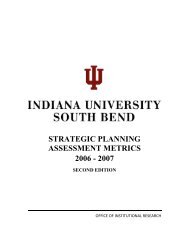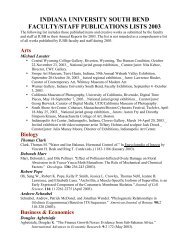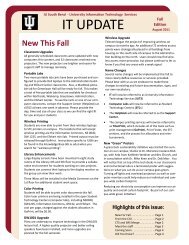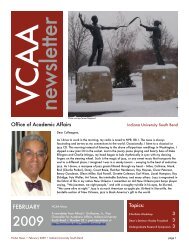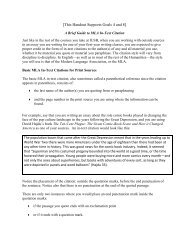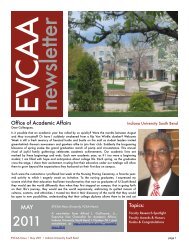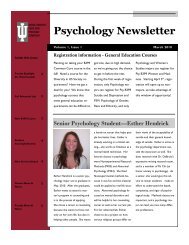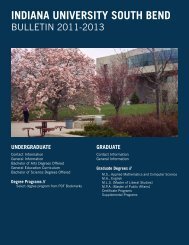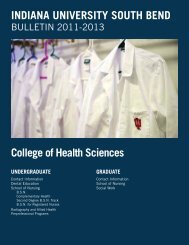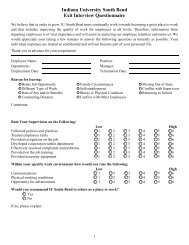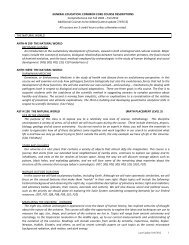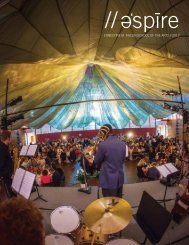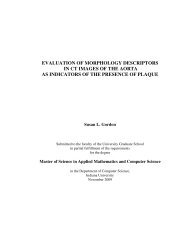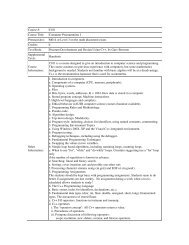Current version - Indiana University South Bend
Current version - Indiana University South Bend
Current version - Indiana University South Bend
You also want an ePaper? Increase the reach of your titles
YUMPU automatically turns print PDFs into web optimized ePapers that Google loves.
HPER-E 159<br />
HPER-E 187<br />
HPER-E 190<br />
HPER-E 233<br />
HPER-E 333<br />
HPER-H 160<br />
HPER-H 617<br />
VT:<br />
HPER-N 220<br />
HPER-P 140<br />
Racquetball (1 cr.)<br />
Instruction in basic skills for beginning<br />
players. Includes both four-wall singles<br />
and doubles games. S/F graded. I, II<br />
Weight Training (1 cr.)<br />
Instruction in basic principles and<br />
techniques of conditioning through use of<br />
free weights. Emphasis on personalized<br />
conditioning programs. S/F graded. I, II<br />
Yoga I (1 cr.)<br />
Yoga is one of the most effective means<br />
of reducing stress, increasing the body’s<br />
overall tone, strength, and flexibility; and<br />
enhances feelings of general well being.<br />
Fitness and Jogging II (1 cr.)<br />
P: Aerobics Level III. A continuation of<br />
HPER-E 133. Course designed to take<br />
students from aerobics Level III to Level<br />
V. S/F graded. I, II<br />
Fitness and Jogging III (1 cr.)<br />
P: HPER-E 233, Level V of aerobics or<br />
capability to run two miles in 12 minutes.<br />
A continuation of HPER-E 233. Course<br />
designed for those students interested<br />
in preparing for marathon running. S/F<br />
graded. I, II<br />
First Aid AND EMERGENCY CARE (2-3 cr.)<br />
Lecture and demonstration of first-aid<br />
measures for wounds, hemorrhage,<br />
burns, exposure, sprains, dislocations,<br />
fractures, unconscious conditions,<br />
suffocation, drowning, and poison with<br />
skill training in all procedures. I<br />
SEMINAR IN HEALTH EDUCATION (1-3 CR.)<br />
Alcohol and Drug Education<br />
Contemporary topics in the area of health<br />
education are studied under the direction<br />
of faculty members with specialized areas<br />
of expertise. Specific topics vary and may<br />
be repeated for credit. II<br />
Nutrition for health (3 cr.)<br />
Basic principles of nutrition. Food needs<br />
of individuals in different age, cultural,<br />
and family settings. I, II, S<br />
Foundations AND PRINCIPLES of<br />
Physical Education (2 cr.)<br />
Introduction to kinesiology as a discipline<br />
and physical education as a subdiscipline<br />
for students interested in teaching<br />
physical education. Historical and<br />
philosophical perspectives of the teaching<br />
of physical education as a profession.<br />
IU SOUTH BEND COURSE DESCRIPTIONS 4345<br />
HPER-P 216<br />
HPER-P 647<br />
VT:<br />
<strong>Current</strong> Concepts AND APPLICATIONS<br />
in Physical FITNESS (3 cr.)<br />
Introduction to physical fitness and the<br />
role of exercise in health and wellness.<br />
Understanding the concepts, principles,<br />
and guidelines for fitness and related<br />
activities. Use of physical fitness<br />
assessment data to plan and carry out a<br />
personal fitness program.<br />
SEMINAR IN PHYSICAL EDUCATION (1-3 CR.)<br />
Advanced Techniques in Team and<br />
Individual Sports<br />
Problems in physical education. Specific<br />
topics vary and may be repeated for<br />
credit.<br />
HPSC: History and Philosophy of<br />
Science<br />
HPSC-T 390<br />
HPSC-X 100<br />
HPSC-X 200<br />
HPSC-X 201<br />
HPSC-X 220<br />
LITERARY AND INTELLECTUAL TRADITIONS<br />
(3 cr.)<br />
Interdisciplinary exploration of a<br />
humanistic tradition of inquiry regarding<br />
one of the following themes: ideas of<br />
self; of truth; of beauty; of community;<br />
of nature; of conflict. Writing intensive,<br />
discussion focused. Attention to primary<br />
texts and research materials.<br />
Human Perspectives on Science (3 cr.)<br />
Selected issues in the history and<br />
philosophy of science. Individual sections<br />
vary in content and major themes, but<br />
all employ case studies to examine the<br />
philosophical, cultural, institutional, and<br />
social impact of science on our lives. May<br />
be repeated once for credit with different<br />
topic.<br />
Scientific Reasoning (3 cr.)<br />
Principles of scientific reasoning and<br />
decision making are presented in a form<br />
useful to scientists and nonscientists for<br />
evaluating scientific information.<br />
Nature of Scientific Inquiry (3 cr.)<br />
Development of methodological and<br />
ethical theory applied to actual cases such<br />
as the Galileo controversy, early eugenics<br />
research, and the use of behavior<br />
modification technology. Emphasis on<br />
critical thinking and clear writing.<br />
ISSUES IN SCIENCE: HUMANIstic (3 CR.)<br />
General topics and themes in the history<br />
and philosophy of science. May be<br />
repeated once for credit with a different<br />
topic for a maximum of 6 credit hours.



